
Leo Segovia, Gender Justice Strategic Advisor
Gendered language is deeply embedded in the way we communicate, so ingrained that we often don’t notice when it’s used. It includes words used to describe a person, most apparently by the pronouns we use for people when we are talking about them, but not directly to them. Pronouns are used to describe people or things without having to use their name.
Often in our society, we use pronouns for others based on how we perceive them to be – as men or women – which we determine primarily by their appearance; however, it is not possible to accurately determine a person’s gender or gender identity by appearance alone. Different gender identities exist and people use varied pronouns corresponding with their gender identity.
Gender pronouns are a small part of a person’s gender expression. Not everyone fits into the categories we use as a basis to determine one’s gender. Continually using the wrong pronoun or intentionally misgendering someone can cause harmful impacts to that person, your relationship with them, and to the morale of your whole team.
Why should I care and how is this connected to the bigger picture?
For many people, it may seem insignificant to worry about pronouns if their gender identity is aligned with both their gender expression and society’s traditional expectations around gender. Disregarding the importance of gendered language at work leads to an environment of alienation and undermines transgender and gender expansive people’s agency over their own self-determination.
In Seattle, many of us are committed to dismantling systems of oppression, particularly those that are sustained through anti-Black racism. The gender binary (man or woman) upholds white supremacy and works to create hierarchies within the structure of white dominant culture. For example, when thinking about the impacts of patriarchy and white supremacy, Black transgender and gender expansive people have a nuanced experience that involves more violence and exclusion from our society and institutions than other populations. Acknowledging how gender impacts our relationships and how we treat one another underscores the importance of using accurate language to honor people as their full selves and supports our efforts to question and interrogate systems of power.
What are your Pronouns?
| He | He laughed. | I called him. | His house. | He left by himself. |
| She | She laughed. | I called her. | Her house | She left by herself. |
| They | They laughed. | I called them. | Their house. | They left by themselves. |
There is no end to the language and creativity people use to describe themselves. The most commonly used gender pronouns include but are not limited to: she/her, he/him, and they/them. If it’s not clear which set of pronouns someone uses and you anticipate working with this person, it’s important to have this information moving forward. A simple way of learning someone’s pronouns is to offer yours in your introduction along with asking for theirs.
Sharing your pronouns when asking helps to avoid assumptions. Remember, you can’t tell what someone’s pronouns are based on how they look. Try, “Hi, my name is ____ and I use ____ pronouns. What’s your name and what pronouns do you use?” or “I’m sorry I forgot to mention, my pronouns are ____. What are yours?”
Note on non-binary pronouns: Some people use “they/them/theirs” as pronouns, but it is also a neutral place holder which is an acceptable way to refer to someone if they haven’t shared their pronouns with you. We already do this when we refer to people without knowing their gender.
For example, “I went to the doctor this morning and they told me my blood work is normal.” If it’s unclear what pronouns someone uses and you aren’t able to ask, use “they” pronouns until you know or simply refer to them by their name; “Helen was just here but Helen ended up leaving early.”
What if I misgender someone?
Mistakes happen. Even with the best intentions you may misgender someone. If that happens apologize, correct yourself, and move on. Becoming defensive or over-apologetic will turn a small mistake into a largely uncomfortable interaction for everyone involved. Specifically, it will place undue burden on the person with whom you’re speaking to comfort you and to validate your behavior. Learn from your mistakes and carry on.
Do I have to share my pronouns?
There are legitimate reasons for why a person may not want to share their pronouns. For example, a transgender person may not feel comfortable or safe sharing their pronouns for fear that this may “out” them and end up disclosing private information they’re unwilling to offer.
For cisgender people who may feel uncomfortable sharing their pronouns it’s important to reflect on why that may be. If checking demographic boxes on paperwork that require you to identify your gender doesn’t trouble you, how do you see sharing pronouns as something different?
Sharing both your name and pronouns can be helpful when trying to have a conversation and when having a conversation about others. Imagine trying to talk about a coworker or a friend without having one or both pieces of information! It’s an opportunity to create better communication practices and to cultivate healthier work conditions for transgender and gender expansive people. However, it is not an opportunity to make jokes or to mock the importance of pronouns for others.
Making a joke out of what your pronouns are is incredibly disrespectful to everyone who is trying to engage in getting to know you. If at work you have always used “she/her” or “he/him” pronouns, is it sincere that when asked your pronouns in a meeting, that you want colleagues to now refer to you as “Diva”, “helicopter”, “popsicle”, etc.? In short, share what you are comfortable with and share only what is true for you.
How can I do more?
- Make it a routine to ask others what pronouns they use and to share your own pronouns during introductions at meetings or when encountering someone for the first time.
- Add your pronouns to your email signature or business cards.
- When developing forms capturing personal or demographic information, provide an optional space to capture a person’s pronouns for future reference.
- Normalize the acknowledgement and importance of using a person’s correct pronouns.


